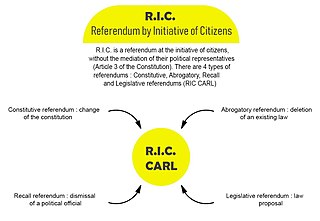 |
|---|
A double referendum on constitutional reform was held in Uruguay on 27 March 1938. Both sets of reforms were approved by voters. [1] [2]
 |
|---|
A double referendum on constitutional reform was held in Uruguay on 27 March 1938. Both sets of reforms were approved by voters. [1] [2]
The first set of reforms had been proposed in a constitutional law on 30 December 1936. [1] They would recognise the "lema" system of factions within political parties and allow several presidential candidates for each lema. [1] The most voted for candidate from the most voted for lema would win the presidential election. [1] The law would also reorganise the Senate. [1]
The second set of reforms were put forward by the General Assembly on 24 February 1938. [2] They would restrict each lema to a single candidate for president, as well as reorganising local government. [2] As this was an administrative initiative by two-fifths of the Assembly, a majority of registered voters voting in favour was required. [2] This was achieved, with 52.47% of all registered voters approving the reforms. [2]
| Choice | Votes | % |
|---|---|---|
| For | 333,802 | 93.45 |
| Against | 23,385 | 6.55 |
| Invalid/blank votes | – | |
| Total | 357,187 | 100 |
| Registered voters/turnout | 636,171 | |
| Source: Direct Democracy | ||
| Choice | Votes | % |
|---|---|---|
| For | 333,802 | 97.99 |
| Against | 6,847 | 2.01 |
| Invalid/blank votes | – | |
| Total | 340,649 | 100 |
| Registered voters/turnout | 636,171 | |
| Source: Direct Democracy | ||
An electoral college is a body whose task is to elect a candidate to a particular office. It is mostly used in the political context for a constitutional body that appoints the head of state or government, and sometimes the upper parliamentary chamber, in a democracy. Its members, called electors, are either elected by the people for this purpose or by certain subregional entities or social organizations.

A popular initiative is a form of direct democracy by which a petition meeting certain hurdles can force a legal procedure on a proposition.

Primary elections or primaries are elections held to determine which candidates will run in an upcoming general election. In a partisan primary, a political party selects a candidate. Depending on the state and/or party, there may be an "open primary", in which all voters are eligible to participate, or a "closed primary", in which only members of a political party can vote. Less common are nonpartisan primaries in which all candidates run regardless of party.

Elections in Venezuela are held at a national level for the President of Venezuela as head of state and head of government, and for a unicameral legislature. The President of Venezuela is elected for a six-year term by direct election plurality voting, and is eligible for re-election. The National Assembly (Asamblea Nacional) has 277 members (diputados), elected for five-year terms using a mixed-member majoritarian representation system. Elections also take place at state level and local level.

Elections in Benin take place within the framework of a multi-party democracy and a presidential system. Both the President and the National Assembly are directly elected by voters, with elections organised by the Autonomous National Electoral Commission (CENA).

Elections in Uruguay encompass three different types: general elections, departamental elections and municipal elections. At the national level, Uruguay elects a head of state and a legislature. Voting is compulsory and extends to all citizens aged 18 and over.
The ley de lemas is a variant of open list proportional representation, which is, or has been, used in elections in Argentina, Uruguay, and Honduras, and works as follows:

The Constitution of Uruguay is the supreme law of Uruguay. Its first version was written in 1830 and its last amendment was made in 2004.

A constitutional referendum was held in Uruguay on 29 November 1942, alongside general elections. The new constitution was approved by 77% of voters.

A constitutional referendum was held in Uruguay on 26 November 1989 alongside general elections. The proposed changes to the constitution would require state pensions to be increased at the same rate as the salary of civil servants. The proposal was approved by 81.78% of those voting and 72.51% of all registered voters.
A constitutional referendum was held in Peru on 25 August 1919. The proposed reforms were approved by voters.

A constitutional referendum was held in Uruguay on 24 November 1946, alongside general elections. Two options for amending the constitution were put to voters, but both were rejected.

A constitutional referendum was held in Uruguay on 16 December 1951. The proposed amendments to the constitution were approved by 54% of voters.

A constitutional referendum was held in Uruguay on 30 November 1958 alongside general elections. Two proposals for amendments to the constitution were put to voters, but both were rejected.

A constitutional referendum was held in Uruguay on 27 November 1966 alongside general elections. Four proposals for amending the constitution were put to voters, with one option receiving 65% of the vote. As a result, the colegiado system was abolished in favour of returning to the presidential system.

A constitutional referendum was held in Uruguay on 8 December 1996. The proposals, which included limiting each party to a single presidential candidate, were narrowly approved by voters.
A referendum on electing a Constitutional Assembly was held in Colombia on 27 May 1990 alongside presidential elections. The proposal was approved by 96% of voters. A Constitutional Assembly was later elected in December 1990 and produced the 1991 constitution.
Parliamentary elections were held in Colombia on 11 March 1990 alongside local elections and an unofficial referendum on electing a Constitutional Assembly.
Constitutional Assembly elections were held in Colombia on 9 December 1990 alongside a referendum on the Assembly itself. The Assembly sat from February to July 1991 and drew up the 1991 constitution.

The Référendum d'initiative Citoyenne is the name given to the proposal for a constitutional amendment in France to permit consultation of the citizenry by referendum concerning the proposition or abrogation of laws, the revocation of politicians' mandates, and constitutional amendment.